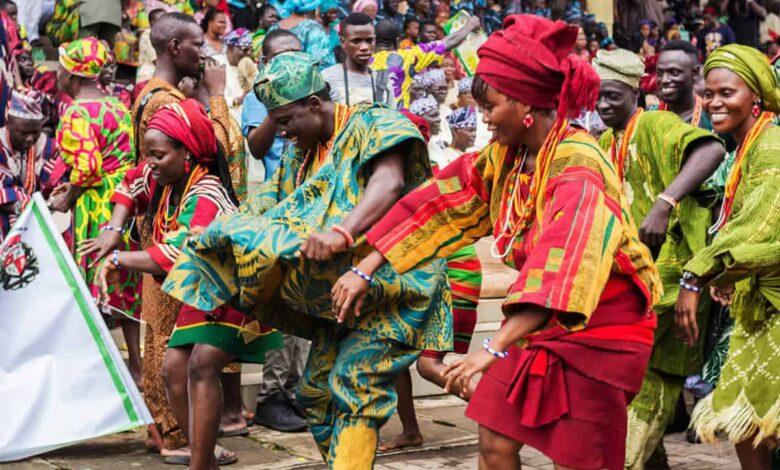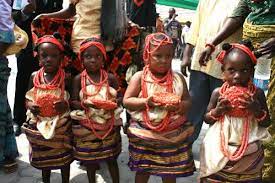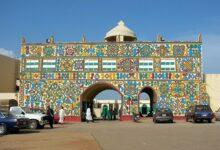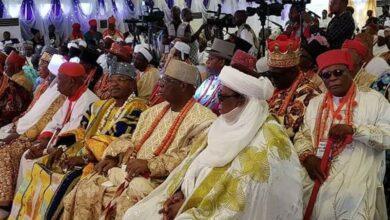
15 Most Popular Indigenous Customs in Nigeria
15 Most Popular Indigenous Customs in Nigeria – Nigeria, a land of diverse cultures and traditions, is home to over 250 ethnic groups, each with its unique customs and practices. These indigenous customs form an integral part of Nigerian society, enriching the nation’s cultural fabric. In this article, we delve into the essence of Nigeria’s heritage and explore the 15 most popular indigenous customs that define its identity.Informationguidenigeria
15 Most Popular Indigenous Customs in Nigeria
Read Also: Top 15 UHD TVs in Nigeria
👉 Relocate to Canada Today!
Live, Study and Work in Canada. No Payment is Required! Hurry Now click here to Apply >> Immigrate to Canada
1. Greeting with a handshake:
In Nigeria, greetings hold great significance and are often expressed through a handshake. This custom symbolizes respect, warmth, and friendship. Handshakes in Nigeria are not just a mere formality but a means of establishing connection and trust.JAMB Form
-
Traditional attire:
Nigerians take great pride in their traditional attire, showcasing the rich cultural heritage of each ethnic group. The vibrant colors, intricate patterns, and diverse fabrics reflect the uniqueness of Nigerian fashion. Traditional attire varies across regions, with notable examples being the Yoruba’s “Aso Oke” and the Igbo’s “George” fabric. JAMB Result
-
Food and drink:
Nigeria’s culinary diversity is a testament to its cultural richness. Nigerian cuisine is characterized by a plethora of flavors, spices, and cooking techniques. Staple foods like jollof rice, pounded yam, egusi soup, and suya (spiced grilled meat) are beloved across the nation. Traditional drinks like palm wine and kunu are also an integral part of Nigerian culture.NYSC Portal
-
Music and dance:
Nigeria’s music and dance traditions are renowned worldwide. From highlife to afrobeat, juju to fuji, and traditional folk music, Nigerian melodies resonate with the soul. The energetic and rhythmic dance moves reflect the celebratory nature of Nigerian society, bringing people together in joyous unity.
15 Most Popular Indigenous Customs in Nigeria
-
Storytelling:
Storytelling is deeply ingrained in Nigerian culture, serving as a means of passing down history, wisdom, and values from one generation to another. Griots, known as “Akéwà” or “Igwele” in some regions, are revered storytellers who possess the skill of oral narration, preserving Nigeria’s folklore and ancestral tales.
-
Festivals:
Nigeria is renowned for its colorful festivals that showcase the cultural heritage of different ethnic groups. Festivals like the Eyo Festival, New Yam Festival, Durbar Festival, and Osun-Osogbo Festival bring communities together in celebration, featuring traditional costumes, music, dance, and rituals.
👉 Relocate to Canada Today!
Live, Study and Work in Canada. No Payment is Required! Hurry Now click here to Apply >> Immigrate to Canada-
Art and craft:
Nigerian art and craft reflect the creativity and craftsmanship of its people. From intricate wood carvings and pottery to beadwork and textile weaving, Nigerian artisans showcase their skills through beautiful and expressive works. The art forms often depict religious beliefs, historical events, and everyday life.
-
Marriage:
Marriage customs in Nigeria vary among ethnic groups but share common themes of celebration, family involvement, and traditional ceremonies. From the Igbo’s “Igba Nkwu” to the Yoruba’s “Engagement Ceremony” and the Hausa’s “Fatihah,” each ceremony is a testament to the significance of marriage within Nigerian society.
-
Death and burial:
Nigerian communities attach great importance to honoring the deceased through elaborate funeral rites and burial customs. Practices such as wake-keeping, singing dirges, and traditional dances are common. Burial ceremonies serve as a way to celebrate the life of the departed and provide closure for the bereaved.
-
Religion:
Nigeria is a diverse religious landscape, with Christianity, Islam, and traditional indigenous religions being the major faiths. Religious customs and practices play a significant role in the daily lives of Nigerians, influencing everything from social interactions to festivals and ceremonies.
Read Also: Top 15 Trendsetting Visuals in Nigeria
-
Names:
Naming customs in Nigeria are influenced by various factors, including religion, culture, and family traditions. Nigerian names often have deep meanings, reflecting aspirations, circumstances of birth, or cultural values. Names also hold spiritual significance and are believed to shape a person’s destiny.
-
Language:
With over 500 languages spoken across the country, Nigeria is a linguistic melting pot. Indigenous languages are a vital part of Nigerian culture and identity. They serve as a means of communication, preserving cultural heritage, and fostering a sense of belonging within ethnic communities.
-
Education:
Education is highly valued in Nigerian society, with a strong emphasis on formal education. However, traditional educational systems still exist, where elders pass down knowledge and skills through apprenticeship and informal learning. Indigenous knowledge systems are respected and valued alongside modern education.
Read Also: Top 15 UHD TVs in Nigeria
-
Sports:
Sports, particularly football (soccer), hold a special place in the hearts of Nigerians. The passion and enthusiasm for the sport bring people together, transcending ethnic, religious, and social boundaries. Nigerian athletes have excelled in various sports, representing the nation on the international stage.
-
Hospitality:
Nigerians are renowned for their warmth and hospitality. The custom of welcoming guests with open arms and offering food, shelter, and friendship is deeply ingrained in the culture. Sharing meals, engaging in lively conversations, and making guests feel at home are essential aspects of Nigerian hospitality.Love Messages
Conclusion:
Nigeria’s indigenous customs embody the nation’s rich cultural heritage and diversity. From the warm greetings to the vibrant traditional attire, tantalizing cuisine, and soul-stirring music, each custom represents a unique facet of Nigerian society. By cherishing and preserving these customs, Nigerians ensure that their heritage remains alive, celebrated, and passed on to future generations.Romantic Love Messages
Check: JAMB Result
Check and Confirm: How much is Dollar to Naira today






